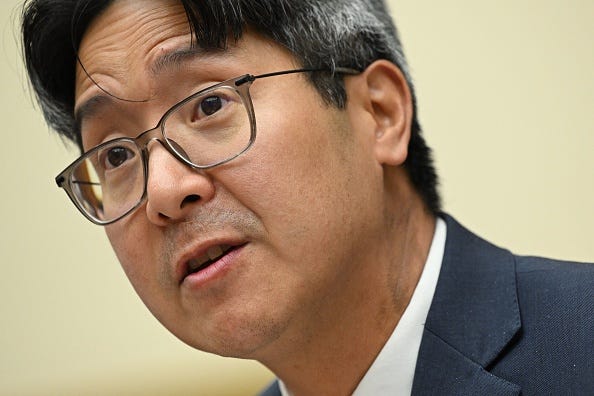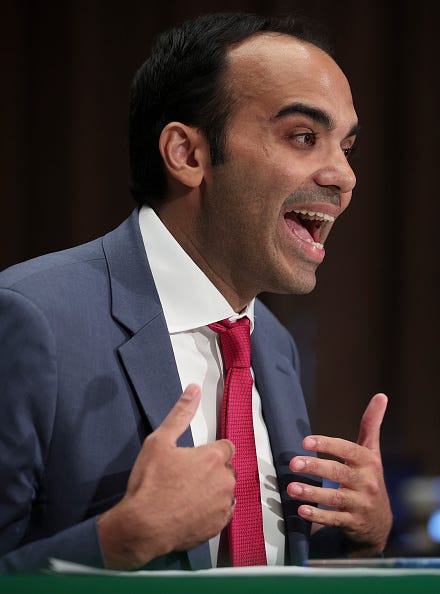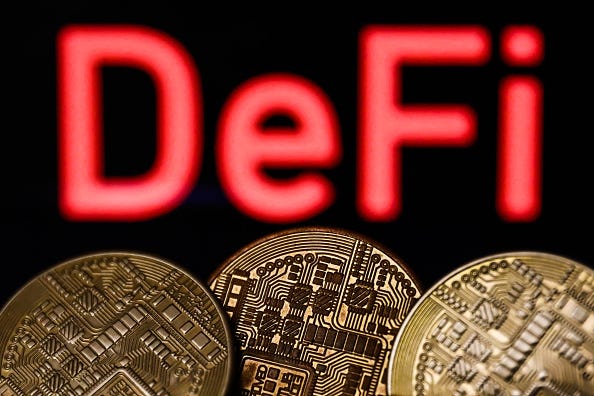OCC's Hsu Steps Up; CFPB Chief Warns Bankers; DeFi Group Sues to Halt `Regulation by Enforcement'
Capitol Account: Free Weekly Edition
With Congress gone, Washington was mostly in spring break mode. Maybe the world of financial regulation needed a breather. Still, there was news — especially in the courts. Most notably, a New York federal judge allowed the vast majority of the SEC’s suit against Coinbase to go forward, a big win for Gary Gensler. Another regulator celebrating a legal victory was CFPB Director Rohit Chopra, after a federal judge in Texas transferred a challenge to the consumer bureau’s credit card late fee cap to D.C. An appeal, however, is already underway. Chopra also spoke this week to one of the bank trade groups suing his agency. No surprise, he had a lot to say.
Digging into a more weedy issue, we looked at why some money market mutual funds are closing — a story that has raised broader questions about SEC rulemaking. And we checked in at the OCC, where the acting comptroller has been out floating controversial policy ideas. Lastly, we covered a novel lawsuit filed by a DeFi association and a small business worried that its digital token marketing plan will prompt an enforcement action.
Thanks for reading our free digest of articles published this week. The daily newsletter had many more. If you like what you see, click the button below to subscribe.
Emerging From the Shadows: In an administration full of hard-charging regulators, Acting Comptroller of the Currency Michael Hsu has stood out mostly for not making waves. But in one of the more intriguing U-turns in financial policy, the mild-mannered ex-Fed staffer has recently been popping up everywhere, offering his take on controversial issues like bank mergers, preventing deposit runs and even oversight of hedge funds and private equity.
The flurry of ideas emanating from the OCC chief over the past several months has prompted consternation on Wall Street, which is already fighting their Biden administration overseers on several big fronts. But the pronouncements have also rattled the left, a group that has never quite trusted Hsu in the first place – and has been instrumental in making sure that he retains “acting” in his title.
One thing both sides agree on, however, is that it’s an odd time to jump into the fray. There’s an election coming and most agencies are rushing to complete rules, not propose them. It’s also not clear what Hsu is trying to accomplish. Is he foreshadowing new regulations? Or is he simply enjoying his time in the spotlight, finally comfortable in the job?
Few expected Hsu, a career bureaucrat, to be in his post this long. Treasury Secretary Janet Yellen plucked him from the upper ranks of Fed supervisors in 2021 to run the OCC while the administration looked for a permanent comptroller. The search turned out to be harder than expected as the White House’s first and second choices ran into trouble with progressives and Republicans, respectively. Three years later, Hsu is the man left standing.
If his acting status has rankled, Hsu hasn’t shown it. But former colleagues and fellow regulators say he tends to act more like a cautious bank supervisor rather than the head of a powerful agency. And while he’s well-liked and respected, Hsu’s long career in government hasn’t given him a base of support on Capitol Hill or in the industry – often important when it comes to pushing through sweeping policy changes.
Hsu wouldn’t agree to an interview, but through a spokesperson, he explains that the issues he’s been speaking out on “are ripe for public discussion.”
“My goal is to provide direction and keep things moving forward, while being as transparent, open-minded and collaborative as possible,” he adds. “The timing largely reflects progress on work we’ve done internally and with peer agencies.”
One fact that hasn’t gone unnoticed in the financial regulation world: the comptroller has unveiled his policy suggestions in a series of speeches on college campuses.
First came remarks on “liquidity risk” at Columbia, where Hsu took on last year’s regional bank panic. He called for making it harder to treat uninsured deposits as liquid assets that can stem a run, and argued that banks must be able to tap the Fed’s discount window at a moment's notice. Two weeks later, at the University of Michigan, he previewed revisions to the OCC’s guidance on merger approvals. Finally in late February, Hsu spoke at Vanderbilt on how to get a better grip on the risks to the financial system posed by hedge funds, private equity and payment companies.
The academic settings and the wonky speeches have provoked a lot of speculation that Hsu may be auditioning for his next act – at a university or think tank. His chief counsel, Benjamin McDonough, has announced he is returning to the Fed next month, which observers took as a signal that more change may be afoot. But many are convinced that Hsu is making a pitch for a spot in the second Biden term, if there is one. An OCC spokesperson declined to comment on his future plans.
Eugene Ludwig, who ran the OCC during the Clinton administration and interviewed Hsu earlier this month at a conference, notes that it’s natural for the leader of an agency to want the validation of Senate confirmation. “I don’t see how he can sit in that seat day after day and do the job he’s doing, and not want to be confirmed,” Ludwig says. (In a glimpse into Hsu’s careful mindset, he planted a few questions in advance of the discussion – a request that Ludwig gently joked about.)
Still, winning Senate confirmation would likely require support from Elizabeth Warren and the outside liberal groups that have been cool to his nomination. Broadly speaking, the left has long been suspicious of Hsu’s central bank background and ties to Yellen. “The Fed has a culture of being close to the bank holding companies – it’s not an adversarial relationship,” one progressive notes.
The liberals are also keenly aware that Hsu has a deciding vote on the FDIC. His acting status, the person stresses, is an effective way to “keep him on-side.”
As he’s shown over the past several years, Hsu is never going to be enough of an activist regulator to please that crowd. But some suspect he might be trying to meet them in the middle.
Toward that end, Hsu has toed the line on the Basel capital plan, forcefully rebutting industry claims in an interview with The Financial Times – and making clear he stands with Fed Vice Chair for Supervision Michael Barr in favoring a tough rule. Hsu’s recent thoughts on mergers also have nodded at progressive viewpoints.
If the statements were meant to entice, however, it hasn't quite worked. Democratic critics wondered why Hsu decided to issue the merger guidance at all – and roll it out in a big speech – when his proposals were so incremental. Americans for Financial Reform chastised him for taking “baby steps.”
Also not pacified: Warren who has routinely bashed Hsu for being weak on bank deals….(Thursday)
Thanks for reading. Follow us on X @CapitolAccount and on LinkedIn by clicking here. We’re always looking for stories, so if you have any suggestions on what we should cover (or comments about Capitol Account), shoot us a note. Rob can be reached at: rschmidt@capitolaccountdc.com and Jessica at: jholzer@capitolaccountdc.com. If somebody forwarded this to you and you’d like to subscribe, click on the button below. Please email for information on our special rates for government employees, academics and groups: subscriptions@capitolaccountdc.com
Lion’s Den: Never one to shy away from confrontation, Chopra seemed to enjoy his marquee speech at the Consumer Bankers Association’s annual conference – probably more than the executives who came to Washington to hear him. But if the CFPB chief was a bit pugnacious, well, he reminded the crowd that their trade group is suing his agency to overturn the cap it imposed just this month on credit card late fees. “We will definitely vigorously defend that,” he stressed.
Shortly after walking on stage to mild applause, Chopra set the tone – highlighting an embarrassing CFPB report (issued under his Republican predecessor) that called out big card companies for obscuring data on credit reports. The reason, he suggested, was to hide whether people were carrying monthly balances or paying off their bills every month. “Revealing that information would allow upstarts, would allow challengers and others, to offer consumers lower rates,” he said. “I don't know if that's necessarily a sign of a competitive market.”
That was far from the only awkward topic the director raised. He touted the agency’s enforcement actions “to make sure that card issuers are living up to the promises that they're making.” And he cited recent research – hotly contested by the industry – showing that smaller card firms offer much lower rates than their larger rivals. “The difference is striking,” he noted.
Chopra also discussed the big jump over the past decade in the average amount of interest credit card issuers are charging over the prime rate. “That excess…adds up to about 250 bucks in additional annual charges for the average card holder with a revolving balance,” he said. “And that shift happened at a time when charge-off rates were falling.”
But even as he tossed out barbs, Chopra was a pretty polite guest. He refrained from harping on “junk fees” and offered some kudos, noting at one point that “credit cards are tremendously useful and attractive.” He also talked up the CFPB’s recently proposed “open banking” rule, which has drawn praise from banks. And he announced a new initiative to make it easier for consumers to compare card deals – couching it as something financial firms should welcome.
After the remarks, CBA President Lindsey Johnson came on the stage and was able to offer a real-time reaction. “That was some speech,” she said. “I'm processing it right now.”
The crowd erupted in laughter…(Tuesday)
Heading to Court: There’s been a lot of litigation over Gensler’s rules. But on Monday, the SEC got hit with an unusual lawsuit – over regulations that it hasn’t issued and an enforcement action that it hasn’t brought. No surprise, it’s coming from the crypto industry.
The case, filed in a Texas federal court by the DeFi Education Fund and a company called Beba, is pretty unique. It’s known as a pre-enforcement challenge, and the court is being asked to declare that a free token the apparel firm created to attract customers is not a security – and thus won’t set off an SEC probe.
The agency has gone after many other “seemingly random individuals and small companies without clarity on why” they are being targeted, the suit says. “Although Beba is a small business that wishes in good faith to use digital assets to bolster its product offerings, it cannot plan its affairs with the SEC’s regulatory sword of Damocles hanging over its head.”
But the DeFi group and Beba have a larger goal, as well. They contend that under Gensler the agency has de facto adopted a policy that almost all digital assets are securities, and they want it declared unlawful. Toward that end, they argue that the agency is violating the Administrative Procedure Act, the law that governs rulemaking, by setting regulations for the industry via enforcement actions.
“That behind-closed-doors policy making approach deprived the digital asset industry and the public of its right under the APA to receive notice of and provide comments on the SEC’s new policy,” the filing says. The upshot, it adds, is that “individuals [are] unable to seek judicial review.”
An SEC spokesperson didn’t respond to a request for comment.
Nick Morgan, a former SEC enforcement lawyer who now runs the Investor Choice Advocates Network, calls the case “very creative” and notes that the APA claim in particular is “novel and may survive a motion to dismiss.”
This is the first time that the DeFi association has filed suit against the SEC. Here’s CEO Miller Whitehouse-Levine on how it came to the decision:
“Congress is not moving quickly, the SEC is. And their regulation by enforcement campaign to chill the entire industry has worked. It's an unsustainable situation. Their view of their own authority is unprecedented, and how they’re enforcing it is unprecedented. So we have to take these unfortunately dramatic actions to push back.”
One more thing: Waco, Texas-based Beba sells high-end duffel bags, backpacks and wallets made by craftspeople in Kenya. Holders can redeem BEBA tokens for discounts on an exclusive product or they can trade them. DeFi education’s Amanda Tuminelli, the chief legal officer, notes that the company isn’t a standard crypto business. “They certainly believe in the ecosystem, but they are using digital assets as a marketing tool,” she says. “It should be clear to them that doing a free airdrop of tokens for marketing purposes is not going to result in them taking heat from the SEC.”…(Monday)
If you enjoy stories like these, go ahead and sign up for the daily newsletter. You won’t regret it:



